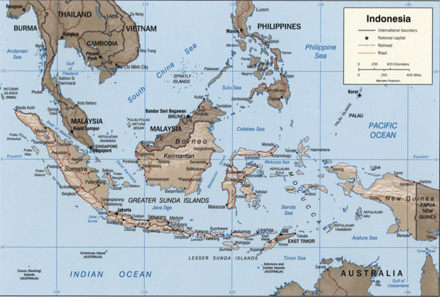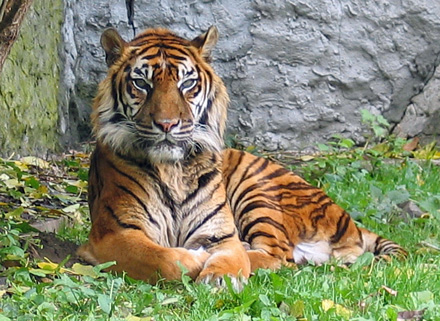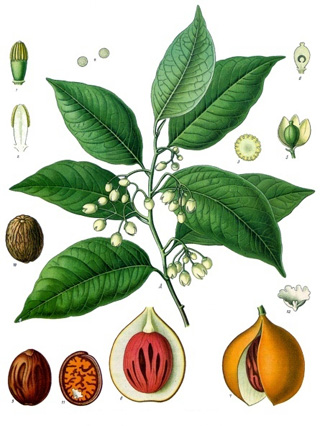Navigation
Indonesia To Plant 100 Million Trees This Year
Indonesia, which has been losing forests at a rapid pace in recent years, plans to plant 100 million trees across the country this year in an effort to limit deforestation, a forestry official said on Wednesday.
 |
| Indonesia map from United States Central Intelligence Agency |
Indonesia, which has been losing forests at a rapid pace in recent years, plans to plant 100 million trees across the country this year in an effort to limit deforestation, a forestry official said on Wednesday.
Indonesia has lost an estimated 70 percent of its original frontier forest, but it still has a total forest area of more than 225 million acres (91 million hectares), with a host of exotic plants and animals waiting to be discovered.
 |
| Panthera tigris sumatran subspecies The Sumatran Tiger, the smallest tiger subspecies only found in Indonesia Photo by Monika Betley, from Wikipedia |
The richest forests are found in Borneo -- the world's third-largest island shared among Indonesia, Malaysia and Brunei -- which is home to about 2,000 types of trees, more than 350 species of birds and 210 mammal species.
The United Nations Food and Agriculture Organisation (FAO) has said in a report that Indonesia was suffering the fastest forest loss in the world at almost 1.9 million hectares per year.
 |
| The nutmeg plant is native to Indonesia's Banda Islands. Once one of the world's most valuable commodities, It drew the first European colonial powers to Indonesia. Illustration of Myristica fragrans nutmeg by Franz Eugen Köhler, in Köhler's Medizinal-Pflanzen from Wikipedia |
In 2007, Indonesia succeeded in planting more than 100 million trees, surpassing its planting target of 79 million, said forestry ministry spokesman Masyhud.
"The realisation of planting in 2007 shows that the public is enthusiastic ... we hope it can become the culture of the community," Masyhud said.
Indonesia plans to start planting on Nov 28 and continue through December to coincide with the rainy season or planting season, Masyhud said.
Southeast Asia's biggest economy is also among the world's top three greenhouse gas emitters because of deforestation, peatland degradation, forest fires, according to a report sponsored by the World Bank and Britain's development arm.
Reporting by Telly Nathalia; Editing by Sugita Katyal and Sanjeev Miglani
Reprinted with permission from Planet Ark. November 20, 2008 Reuters News Service
Search
Latest articles
Agriculture
- World Water Week: Healthy ecosystems essential to human health: from coronavirus to malnutrition Online session Wednesday 24 August 17:00-18:20
- World Water Week: Healthy ecosystems essential to human health: from coronavirus to malnutrition Online session Wednesday 24 August 17:00-18:20
Air Pollution
- "Water and Sanitation-Related Diseases and the Changing Environment: Challenges, Interventions, and Preventive Measures" Volume 2 Is Now Available
- Global Innovation Exchange Co-Created by Horizon International, USAID, Bill and Melinda Gates Foundation and Others
Biodiversity
- It is time for international mobilization against climate change
- World Water Week: Healthy ecosystems essential to human health: from coronavirus to malnutrition Online session Wednesday 24 August 17:00-18:20
Desertification
- World Water Week: Healthy ecosystems essential to human health: from coronavirus to malnutrition Online session Wednesday 24 August 17:00-18:20
- UN Food Systems Summit Receives Over 1,200 Ideas to Help Meet Sustainable Development Goals
Endangered Species
- Mangrove Action Project Collaborates to Restore and Preserve Mangrove Ecosystems
- Coral Research in Palau offers a “Glimmer of Hope”
Energy
- Global Innovation Exchange Co-Created by Horizon International, USAID, Bill and Melinda Gates Foundation and Others
- Wildlife Preservation in Southeast Nova Scotia
Exhibits
- Global Innovation Exchange Co-Created by Horizon International, USAID, Bill and Melinda Gates Foundation and Others
- Coral Reefs
Forests
- NASA Satellites Reveal Major Shifts in Global Freshwater Updated June 2020
- Global Innovation Exchange Co-Created by Horizon International, USAID, Bill and Melinda Gates Foundation and Others
Global Climate Change
- It is time for international mobilization against climate change
- It is time for international mobilization against climate change
Global Health
- World Water Week: Healthy ecosystems essential to human health: from coronavirus to malnutrition Online session Wednesday 24 August 17:00-18:20
- More than 400 schoolgirls, family and teachers rescued from Afghanistan by small coalition
Industry
- "Water and Sanitation-Related Diseases and the Changing Environment: Challenges, Interventions, and Preventive Measures" Volume 2 Is Now Available
- Global Innovation Exchange Co-Created by Horizon International, USAID, Bill and Melinda Gates Foundation and Others
Natural Disaster Relief
- STOP ATTACKS ON HEALTH CARE IN UKRAINE
- Global Innovation Exchange Co-Created by Horizon International, USAID, Bill and Melinda Gates Foundation and Others
News and Special Reports
- World Water Week: Healthy ecosystems essential to human health: from coronavirus to malnutrition Online session Wednesday 24 August 17:00-18:20
- STOP ATTACKS ON HEALTH CARE IN UKRAINE
Oceans, Coral Reefs
- World Water Week: Healthy ecosystems essential to human health: from coronavirus to malnutrition Online session Wednesday 24 August 17:00-18:20
- Mangrove Action Project Collaborates to Restore and Preserve Mangrove Ecosystems
Pollution
- Zakaria Ouedraogo of Burkina Faso Produces Film “Nzoue Fiyen: Water Not Drinkable”
- "Water and Sanitation-Related Diseases and the Changing Environment: Challenges, Interventions, and Preventive Measures" Volume 2 Is Now Available
Population
- "Water and Sanitation-Related Diseases and the Changing Environment: Challenges, Interventions, and Preventive Measures" Volume 2 Is Now Available
- "Water and Sanitation-Related Diseases and the Changing Environment: Challenges, Interventions, and Preventive Measures" Volume 2 Is Now Available
Public Health
- Honouring the visionary behind India’s sanitation revolution
- Honouring the visionary behind India’s sanitation revolution
Rivers
- World Water Week: Healthy ecosystems essential to human health: from coronavirus to malnutrition Online session Wednesday 24 August 17:00-18:20
- Mangrove Action Project Collaborates to Restore and Preserve Mangrove Ecosystems
Sanitation
- Honouring the visionary behind India’s sanitation revolution
- Honouring the visionary behind India’s sanitation revolution
Toxic Chemicals
- "Water and Sanitation-Related Diseases and the Changing Environment: Challenges, Interventions, and Preventive Measures" Volume 2 Is Now Available
- Actions to Prevent Polluted Drinking Water in the United States
Transportation
- "Water and Sanitation-Related Diseases and the Changing Environment: Challenges, Interventions, and Preventive Measures" Volume 2 Is Now Available
- Urbanization Provides Opportunities for Transition to a Green Economy, Says New Report
Waste Management
- Honouring the visionary behind India’s sanitation revolution
- Honouring the visionary behind India’s sanitation revolution
Water
- Honouring the visionary behind India’s sanitation revolution
- Honouring the visionary behind India’s sanitation revolution
Water and Sanitation
- Honouring the visionary behind India’s sanitation revolution
- Honouring the visionary behind India’s sanitation revolution

